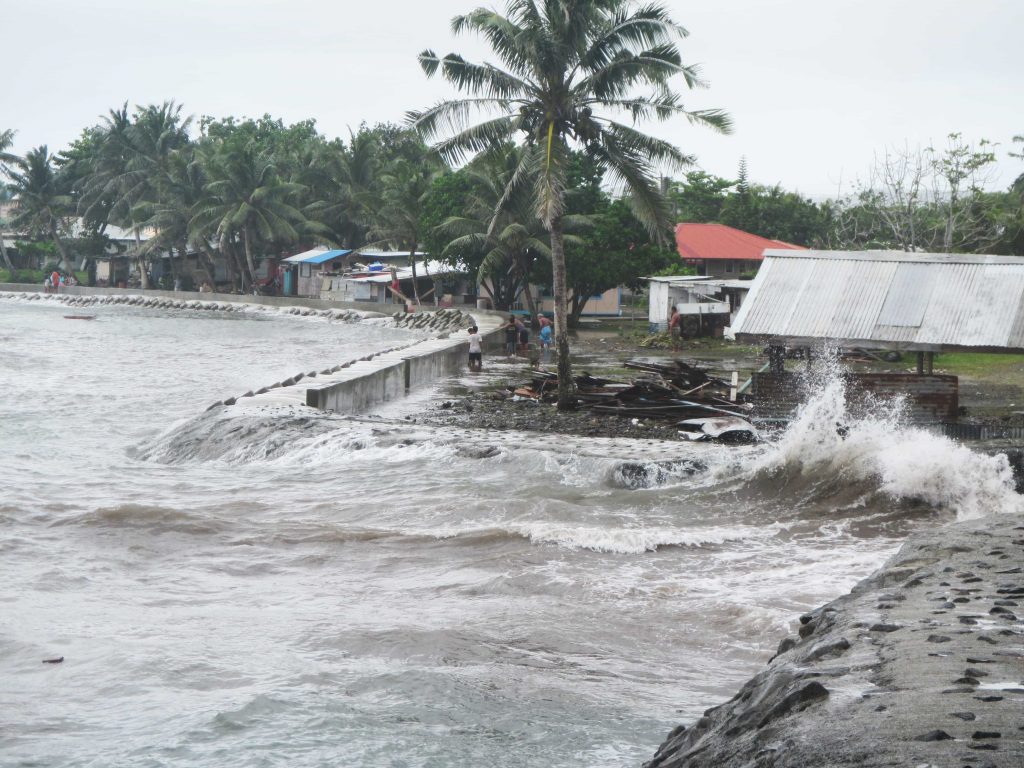PacIOOS is collaborating with partners in the Pacific Islands, the Pacific Northwest, and Alaska to improve access to ocean data for Indigenous coastal communities through a new project funded by the National Science Foundation (NSF) Convergence Accelerator program.
Indigenous coastal communities have depended on ocean resources over millennia but climate change is creating a more unpredictable ocean by influencing waves, sea level, temperature, and other factors, profoundly impacting remote coastal communities.
The goal of the project is to get oceanographic data into the hands of Indigenous communities in a way that takes advantage of existing, lower cost wave buoy technology and enables sustained community-led stewardship of the buoys. Through co-design, the team aims to revolutionize the status quo by providing new tools and new connections that will provide critical safety information at a locally relevant scale.
“Wave data, for example, can help a local mariner determine whether it is safe to fish that day or travel to another island to deliver goods,” said Melissa Iwamoto, director of PacIOOS and co-principal on the NSF project. “Our partners and users are asking for more ocean information to enhance safety and improve decision-making, and many also want more autonomy in maintaining the instrumentation.”

Collaboration is key to developing solutions
Three regional systems of the U.S. Integrated Ocean Observing System (PacIOOS in Hawaiʻi and the U.S. Pacific Islands, NANOOS in the northwest U.S., and AOOS in Alaska); Sofar Ocean, a low-cost buoy and sensor company; and Indigenous partners from the Pacific Islands (villages in the Marshall Islands and American Samoa via the Marshall Islands Conservation Society and the National Park of American Samoa), Washington coast (Quileute Tribe and Quinault Indian Nation), and Alaska (11 whaling villages in the Arctic) will collectively work to develop solutions to overcome existing hurdles of observing technologies that are too expensive to purchase and too expensive to sustain when conducted in isolation.
In the initial phase of the project, partners will work to assess coastal community needs and determine how existing lower-cost Sofar Ocean Spotter wave buoy and Smart Mooring technologies can address those needs. Working together, they will develop community-driven stewardship programs that can maintain the buoys into the future in partnership with the regional ocean observing systems, utilizing the strengths of the regional systems to serve data to remote communities in ways that work for them.
The collaboration embraces new, lower-cost technologies and utilizes the power of local ownership for maintaining ocean observations that are critical to serve the blue economy worldwide. The Indigenous communities in turn will provide feedback on the utility of the technologies as well as offering input on ocean conditions from centuries of local observations. The co-designed approach is in line with the focus of NSF’s Convergence Accelerator: advancing use-inspired solutions into practical applications that address large-scale societal challenges.
“Increased access to ocean data is essential for coastal communities’ safety and livelihoods,” said Iwamoto. “We are excited by how this project will help us to quickly advance our goals to address our user needs through collaboration with new and existing partners across disciplines and geographies.”
In addition to providing localized data for coastal communities, the data will be available for large-scale scientific research to improve understanding and prediction of coastal dynamics, especially in a changing ocean.
More about NSF’s Convergence Accelerator
National-scale societal challenges cannot be solved by a single discipline. Instead, these challenges require convergence: the merging of innovative ideas, approaches, and technologies from a wide and diverse range of sectors and expertise. Launched in 2019, the NSF Convergence Accelerator is an intense, hands-on 9-month journey that builds upon basic research and discovery to accelerate solutions toward societal impact.
If funded for phase two of the accelerator program, the team’s work will broaden participation and networking to more communities, to serve needs of underserved communities and further adapt innovative technologies and techniques.